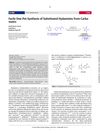 4 citations,
January 1998 in “Heterocycles”
4 citations,
January 1998 in “Heterocycles” Researchers made two new compounds that could be used for medicine.
10 citations,
February 2021 in “International Journal of Nanomedicine” Chitosan-decorated finasteride nanosystems improve skin retention and could be a better treatment for hair loss.
 45 citations,
February 2005 in “Steroids”
45 citations,
February 2005 in “Steroids” Four new compounds were more effective than finasteride in treating prostate issues and hair loss, with one being 100 times more active and safe for use.
 6 citations,
May 2018 in “Plant Cell, Tissue and Organ Culture (PCTOC)”
6 citations,
May 2018 in “Plant Cell, Tissue and Organ Culture (PCTOC)” Adding yeast extract and methyl jasmonate to Eclipta alba cell cultures increased the production of the compound wedelolactone.
 18 citations,
March 2014 in “Drug Development and Industrial Pharmacy”
18 citations,
March 2014 in “Drug Development and Industrial Pharmacy” New gel formulas without ethanol and propylene glycol, containing a minoxidil-methyl-β-cyclodextrin complex, have been created for treating hair loss.
 1 citations,
August 2024 in “Polymers”
1 citations,
August 2024 in “Polymers” Bacterial cellulose is a promising material for biomedical uses but needs improvements in antimicrobial properties and degradation rate.
 26 citations,
January 1994 in “Clinics in Dermatology”
26 citations,
January 1994 in “Clinics in Dermatology” Artificial skin is improving wound healing and shows potential for treating different types of wounds.
 63 citations,
August 2008 in “Journal of Cosmetic Dermatology”
63 citations,
August 2008 in “Journal of Cosmetic Dermatology” Cuscuta reflexa extract may help treat hair loss caused by hormones.
 7 citations,
July 2018 in “Biological & Pharmaceutical Bulletin”
7 citations,
July 2018 in “Biological & Pharmaceutical Bulletin” Phyllanthus urinaria extract may help treat hair loss by blocking a hair-related enzyme.
 9 citations,
January 2017 in “Organic Process Research & Development”
9 citations,
January 2017 in “Organic Process Research & Development” In 2017, a new method was created to efficiently produce a topical antiandrogen, a compound used to treat excess sebum and acne, with a high yield and purity.
 5 citations,
September 2009 in “Journal of Complementary and Integrative Medicine”
5 citations,
September 2009 in “Journal of Complementary and Integrative Medicine” Citrullus colocynthis fruit extract and its compound may help treat enlarged prostate.
 34 citations,
February 1993 in “Journal of steroid biochemistry and molecular biology/The Journal of steroid biochemistry and molecular biology”
34 citations,
February 1993 in “Journal of steroid biochemistry and molecular biology/The Journal of steroid biochemistry and molecular biology” Certain 4-azasteroids are effective at blocking the enzyme that processes testosterone in human skin and could help treat acne, excessive hair growth, and male pattern baldness.
 1 citations,
February 2021 in “Cosmetics”
1 citations,
February 2021 in “Cosmetics” Fagraea berteroana fruit extract may promote hair growth by affecting cell proliferation and hair growth pathways.
 51 citations,
March 2006 in “Bioorganic & Medicinal Chemistry”
51 citations,
March 2006 in “Bioorganic & Medicinal Chemistry” Newly made nicotinamide compounds could potentially treat cancer.
 April 2017 in “The journal of investigative dermatology/Journal of investigative dermatology”
April 2017 in “The journal of investigative dermatology/Journal of investigative dermatology” CD101 is highly effective in treating dermatophytosis in guinea pigs.
April 2017 in “The journal of investigative dermatology/Journal of investigative dermatology” Topical Vorinostat shows promise for treating alopecia areata by promoting hair regrowth.
 37 citations,
January 2015 in “Evidence-based Complementary and Alternative Medicine”
37 citations,
January 2015 in “Evidence-based Complementary and Alternative Medicine” An extract from Quercus acutissima bark was found to reduce sebum production and block an enzyme linked to acne.
3 citations,
February 2024 in “International journal of molecular sciences” Hesperidin from orange peels is a promising natural ingredient for skincare due to its multiple beneficial properties.
 3 citations,
August 2017 in “Synlett”
3 citations,
August 2017 in “Synlett” Scientists in India found a safer and efficient way to make a type of medicine called hydantoins from carbamates, which also worked well in making the seizure medicine, Ethotoin.
1 citations,
October 2018 in “InTech eBooks” Ethosomes are a promising method for treating hair loss by delivering drugs directly to the scalp.
 101 citations,
October 2016 in “Nanomedicine: Nanotechnology, Biology and Medicine”
101 citations,
October 2016 in “Nanomedicine: Nanotechnology, Biology and Medicine” Fullerenes show potential in skin care but need more safety research.
1 citations,
February 2024 in “Pharmaceutics” Nanovesicles improve drug delivery through the skin, offering better treatment outcomes and fewer side effects.
January 2025 in “Molecules” Caffeine may help with hair loss, but more research is needed to confirm its effectiveness.
 December 2024 in “Advanced Composites and Hybrid Materials”
December 2024 in “Advanced Composites and Hybrid Materials” Electrospun 3D nanofibrous materials show promise for bone regeneration in orthopaedics.
 2 citations,
August 2023 in “Pharmaceutics”
2 citations,
August 2023 in “Pharmaceutics” New skin disease treatments using TDDS are improving but face challenges like side effects and high costs.
 35 citations,
October 2015 in “International Journal of Pharmaceutics”
35 citations,
October 2015 in “International Journal of Pharmaceutics” Tiny particles carrying roxithromycin can effectively target and deliver the drug to hair follicles without irritation.
 6 citations,
April 2014 in “European journal of medicinal chemistry”
6 citations,
April 2014 in “European journal of medicinal chemistry” New compounds similar to cromakalim were less effective at inhibiting insulin release but improved in solubility and one acted as a calcium entry blocker, not a potassium channel opener.
 60 citations,
January 2014 in “Anais Brasileiros De Dermatologia”
60 citations,
January 2014 in “Anais Brasileiros De Dermatologia” Nanotechnology in dermatology shows promise for better drug delivery and treatment effectiveness but requires more safety research.
 188 citations,
October 2012 in “The AAPS Journal”
188 citations,
October 2012 in “The AAPS Journal” The document concludes that developing generic topical drugs requires ensuring they match the original in quality, composition, and structure, and often involves complex testing and regulatory steps.
 16 citations,
September 2018 in “Journal of Molecular Liquids”
16 citations,
September 2018 in “Journal of Molecular Liquids” The PS-b-PAA copolymer nanomicelles are effective for delivering a cancer treatment drug in photodynamic therapy.
























